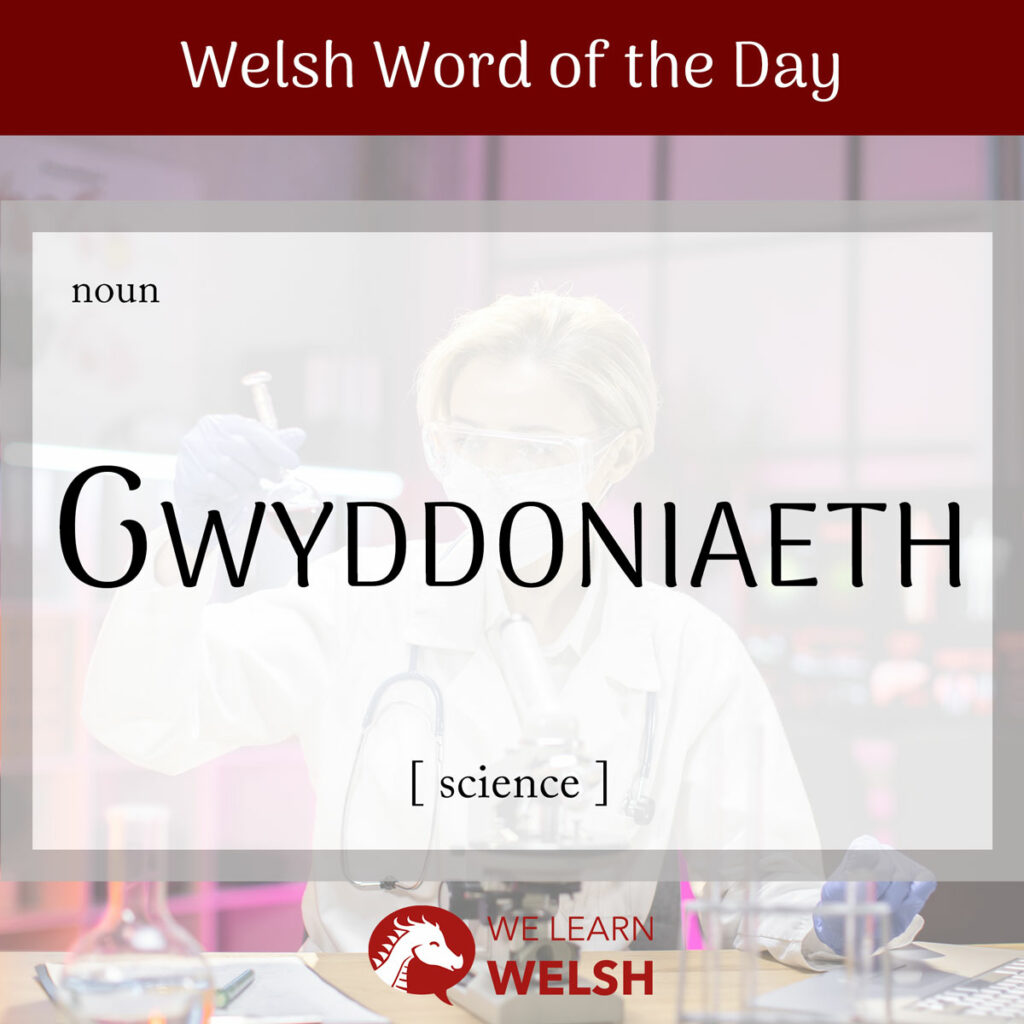Are you fascinated by the wonders of the human corff (body), or the mysteries of gronynnau isatomig (sub-atomic particles)? If it stretches the ymennydd (brain) to talk about gwyddoniaeth (science) in English, let’s kick it up a notch and try discussing this worthy intellectual pursuit in Welsh!
gwyddoniaeth
science
This is a feminine noun, and it’s not countable. But there is a synonym, gwyddor, which is countable – its plural is gwyddorau and it’s feminine too.
So we’d use gwyddor instead if we were going to say something like the sciences or describe a particular field of science. For example, political science is gwyddor gwleidyddiaeth.
Soft mutation
wyddoniaeth
Nasal mutation
ngwyddoniaeth
Aspirate mutation
N/A
Gwyddoniaeth is an extension of gwyddon, an old-fashioned word for scientist that has now largely been replaced by gwyddonydd and gwyddonwr. Interestingly, gwyddon is also an old word for philosopher and even magician!
The reason behind these very different professions being represented with the same word is that they all come from the verb gwybod (to know).
Gwybod is used to talk about knowing any kind of fact, information or wisdom, and the separate word adnabod is used to mean knowing in the sense of recognising or being familiar with a person, place or idea. It comes from combining the proto-Celtic *wid (to know / to see) with the basic verb bod (to be).
Interestingly, since bod conjugates irregularly, its product gwybod also has quite weird conjugations. This may be why it has produced words like gwyddor, gwyddon and gwyddoniaeth, where only the first syllable remains intact.
Today, the word gwyddoniaeth is generally used quite specifically to talk about fields of knowledge like bioleg (biology), cemeg (chemistry), and ffiseg (physics). But its etymology betrays a different story, reflecting the fact that in Welsh, like in English, the concept of science was originally much broader, referring more generally to many kinds of human knowledge and inquiry.
Mae Tom yn mwynhau dysgu gwyddoniaeth yn yr ysgol.
Tom is enjoying learning science at school.
Aside from those I’ve already mentioned, here are some of the biggest branches of gwyddoniaeth:
- meddygaeth = medicine
- ecoleg = ecology
- daeareg = geology
- biocemeg = biochemistry
- ffisig cemegol = chemical physics
- mecaneg = mechanics
- seryddiaeth = astronomy
All these are examples of y gwyddorau naturiol (the natural sciences) which is what most people mean when they say gwyddoniaeth or science.
But some people also count rhesymeg (logic), mathamateg (mathematics) and related subjects as gwyddorau (sciences), too – these are called y gwyddorau ffurfiol.
In the past couple of centuries, disciplines like cymdeithaseg (sociology), seicoleg (psychology), gwleidyddiaeth (politics), economeg (economics) and ieithyddiaeth (linguistics) have begun to be referred to as y gwyddorau cymdeithsaol (the social sciences).
Lastly, there is gwyddoniaeth gymhwysol (applied science) – as opposed to gwyddoniaeth bur (pure science). This can be based on any kind of gwyddoniaeth; it just means taking information and skills from that field and using them to solve real life problems.
And as we all know, gwyddoniaeth gymhwysol is a particularly lucrative choice for those seeking out a future career! You can work in meddygaeth as a meddyg (doctor) or llawfeddyg (surgeon), test and develop cyffuriau (drugs), or become a peiriannydd / peiriannwr (engineer), for example. And that’s just the start of it.
Plus, there also are a lot of gwyddoniaeth-based positions in dysgu (teaching) and ymchwilio (research) in these areas, based in prifysgolion (universities) and labordai (laboratories).
Then you might get to use some of the following offer (equipment):
- profdiwb / tiwb prawf = test tube
- chwistrell = syringe
- piped = pipette
- microsgop = microscope
- gwydryn = lens
- tân Bynsen = Bunsen burner
- thermomedr = thermometer
- fflaim = scalpel

In particular, the government is currently trying to encourage young women into what’s called GTPM (STEM) – gwyddoniaeth (science), technoleg (technology), peirianneg (engineering) and mathamateg (mathematics). Jobs in these areas tend to be interesting, prestigious and highly paid, so the fact that women historically haven’t pursued these careers is a factor contributing to the gender pay gap.
Dw i’n mwynhau darllen ffuglen wyddonol.
I enjoy reading science fiction.
We’ve talked a lot about gwyddoniaeth in the context of specific fields of knowledge, but the word is also used more broadly. It can refer to anything that’s precise or to a line of inquiry that follows what’s known as the dull gwyddonol—the scientific method.
This is why, for example, topics like cymdeithaseg (sociology) can now be considered kinds of gwyddoniaeth – because they use a specific kind of empirical method for research and knowledge production, characterised by scepticism and high standards for proof.
So that’s why there are phrases like to reduce something to a science, meaning to deal with something in a very systematic and intelligent way. You can translate this pretty directly into Welsh, gwneud rhywbeth yn wyddor (making something into a science), but gwneud rhywbeth yn crefft (making something into a craft) is more idiomatic.
Now, Wales is well-known for its culture of love and respect for the arts. But did you know there have been many influential Welsh scientists, too?
One particularly famous example is the daeryddwr (geographer) and biolegwr (biologist) Alfred Russell Wallace, who developed theories describing esblygiad (evolution) around the same time as Charles Darwin.
Wallace was born in Trefynwy (Monmouth) and lived for much of his life in Castell-nedd (Neath), where he was inspired in his studies by the beautiful byd naturiol (natural world) surrounding him.
A less well-known example is that of dyfeisiwr (inventor) William Frost, an ordinary working-class man from Pembrokeshire. Despite his lack of wealth or education, Frost pioneered an early design for a flying machine that was something of a cross between an awyren (aeroplane) and a balŵn aer poeth (hot air balloon). Sadly, he was unable to afford patent fees and received very little recognition for his achievements in his life or after it.
Is there any more geirfa gwyddonol (scientific vocabulary) you’d like us to cover? Let us know!

